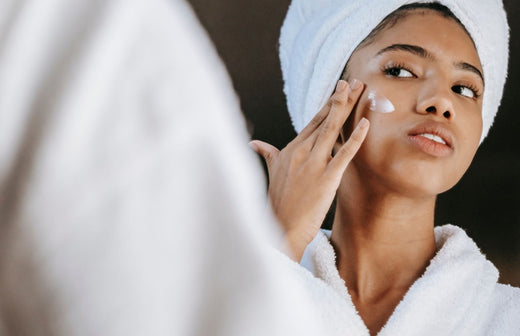

If you have the dry, itchy skin that comes along with eczema, you know the struggle to keep it under control. But It’s an even harder struggle when the patches are on your face. With the heat of summer in full swing, having to deal with it during this season, where heat plays a big role in triggers can really ruin your confidence, plus your social life.
If you’re at a cross road of how to treat eczema and not stay stuck at home during heat waves, there are simple and natural ways to help relieve, soothe, and protect your face eczema from ruining your summer plans! We break it down for you so you can stop worrying about your triggers and flare-ups and enjoy time in the sun!
Is Face Eczema Different Than Regular Eczema?
While you may think of eczema as one health condition, it’s actually an umbrella term for a cluster of similar skin diseases that cause your skin to become itchy, red, and swollen. More than 31 million people deal with some form of eczema in the United States, according to the National Eczema Association. That’s a lot of people with skin concerns!
The skin on your face is much more delicate than the skin on your body, so it requires more care and extra gentle ingredients, which are not so easily accessible if you buy from drugstores. But to treat the problem, you need to establish that your dry skin is indeed facial eczema and just regular dry skin (there is a noticeable difference between the two scientifically).
How can you tell if you have eczema on your face and what may be causing it? It can be tricky to distinguish the difference between eczema and dry skin—both are dry, both can be itchy, and both can be irritated with harsh products.
The key difference? Eczema usually flares up as patches in specific areas, like around your eyes or nose. On the body, eczema often surfaces in the creases of your arms or knees. These are key points to look out for when comparing dry skin versus face eczema.
Other telltale signs of eczema include swelling, redness, and flakes. An easier way to remember is this: Eczema looks angrier. It’s important to note that there are different types of eczema, which can be discussed and identified with a dermatologist, such as:
- Atopic dermatitis may show up on the cheeks and come along with asthma and/or hay fever.
- Contact dermatitis is associated with a specific allergen, like a harsh detergent or fragrance your body doesn’t like.
- Seborrheic dermatitis is common on the nose and scalp and linked to yeast.
Experts aren’t 100 percent sure what causes eczema at its root, however, most say it’s genetic and likely starts with a genetic predisposition and is then triggered by things like cold weather, hot showers, bacteria, stress, yeast, and hormonal changes (that’s why people sometimes experience flare-ups during pregnancy).
How to Treat Face Eczema – Simply & Naturally
It’s common and generally safe to treat body eczema with topical steroids, but you need to be careful applying the same products to your face. Steroids can thin your skin if used improperly. That’s why it’s important to start with more mild, moisturizing products, then go from there. The goal is to restore the barrier function of your skin without causing more irritation. If you keep that in mind, it will go a long way in managing your eczema outbreaks!
One extra challenge when treating facial eczema: You probably use a lot of products on your face that you don’t use on your body, and some of those products aren’t the best choice when tackling a flare-up. Avoiding any potentially irritating products (like retinoids and glycolic acid) that can increase inflammation, is a good option.
Everyone loves reducing wrinkles, dark spots, and saggy skin just as much as anyone else, but eliminating facial eczema should be your number one priority. Eczema is a medical condition that can turn into an infection if untreated, especially if you scratch at it and it leads to open wounds.
Ready for your super approachable treatment plan? Keep your routine simple and hold off on makeup during a flare-up—no eye shadow if you have eczema around your eyes or lip products if it’s on your lips. After taking a lukewarm shower (hot water will dry out your skin even further), apply a fragrance-free moisturizer as soon as you dry off when your skin will absorb it better.
Any time you decide to try a new product, do a patch test. Apply a pea-sized amount to your wrist and monitor it for any allergic reaction after 24 hours. For the best and natural skin care to help keep your face eczema at bay, visit the Wild Naturals online store today!


